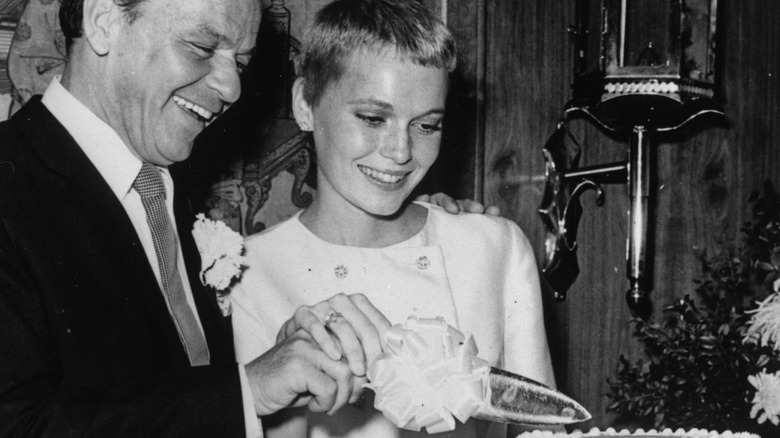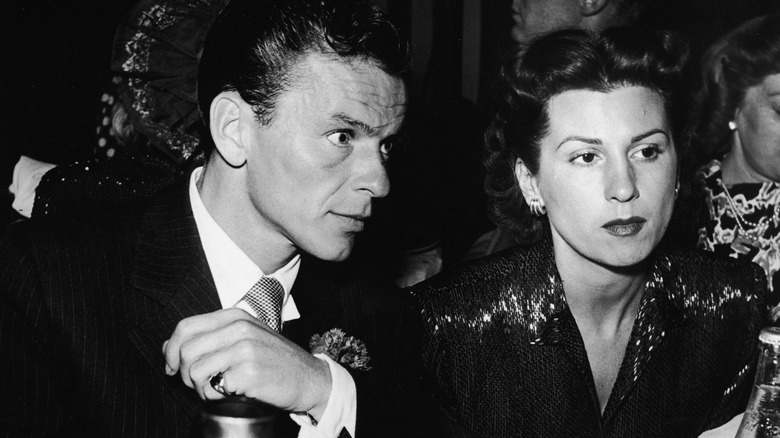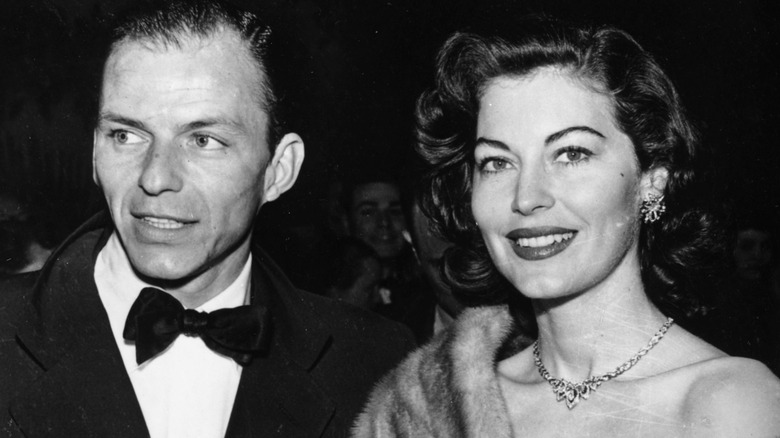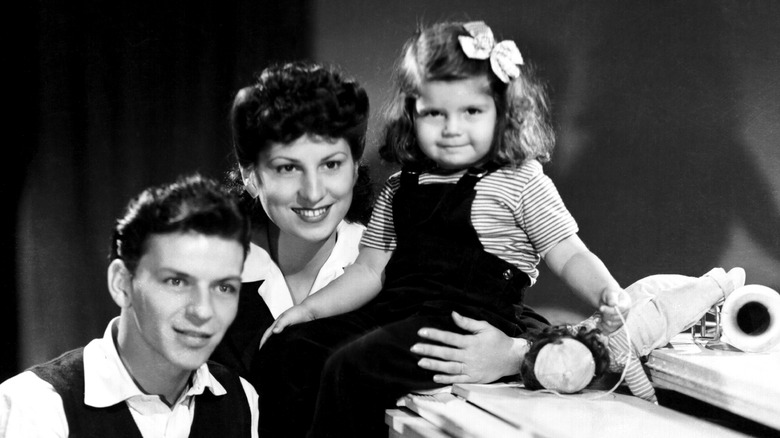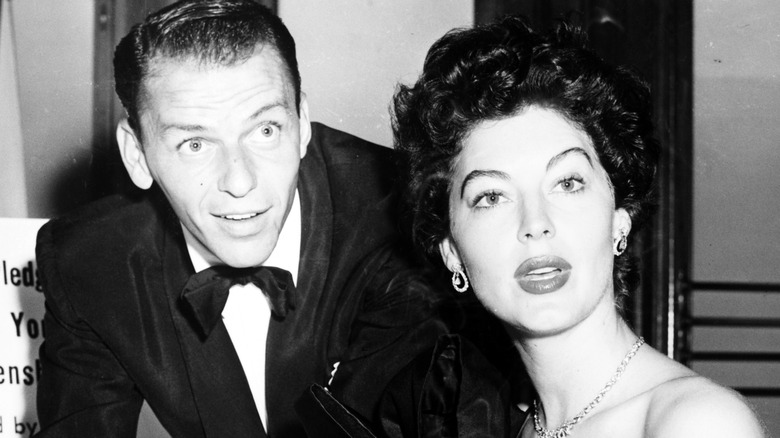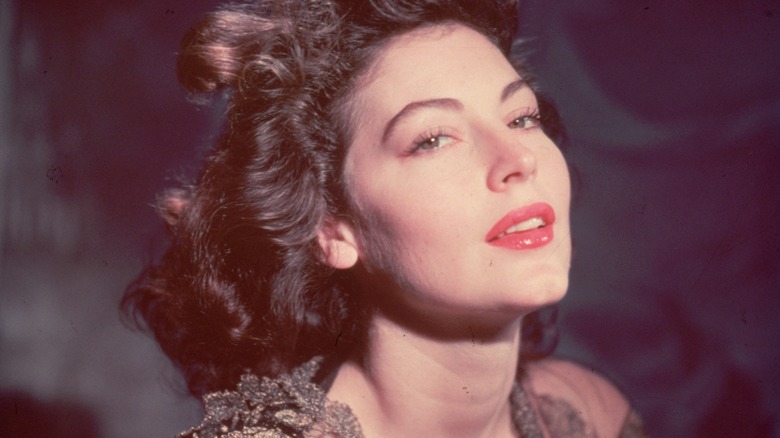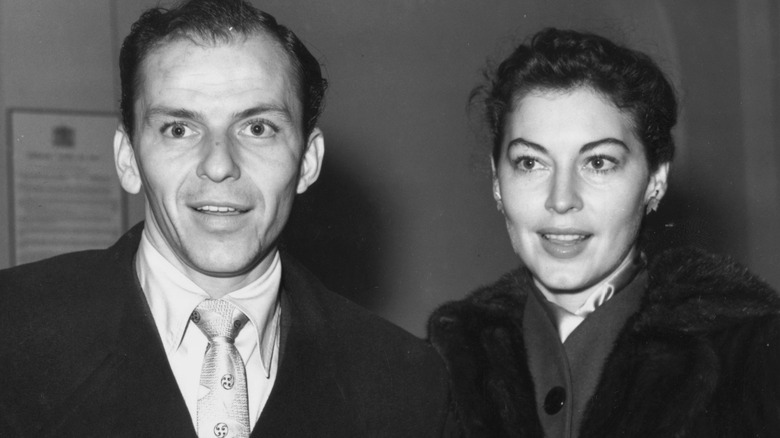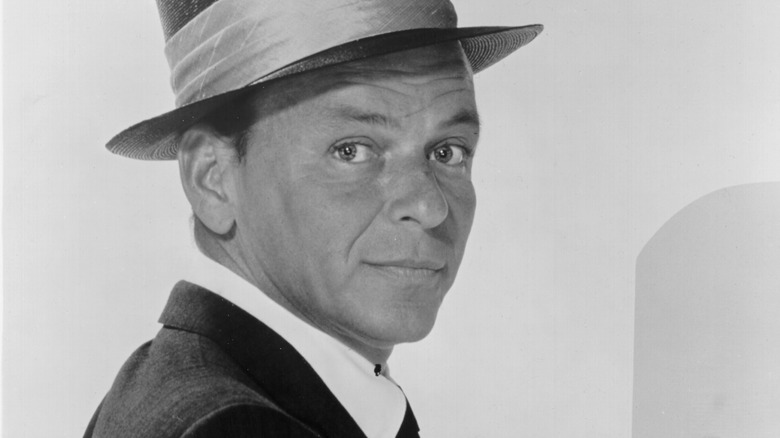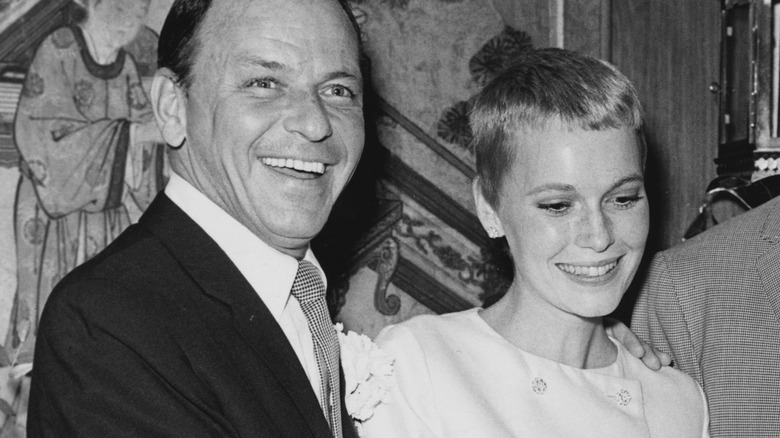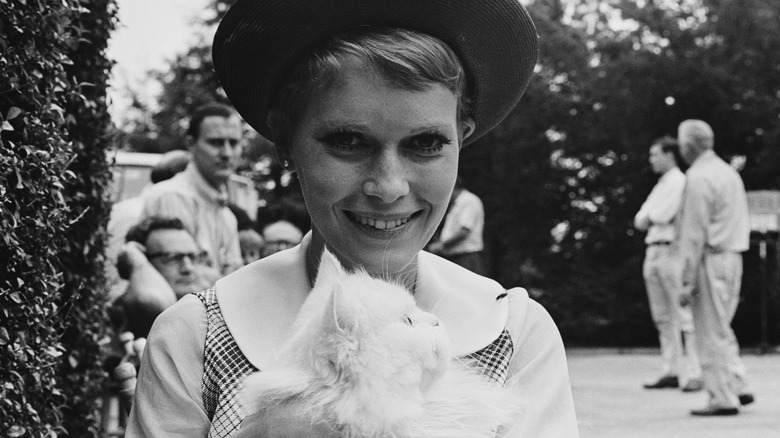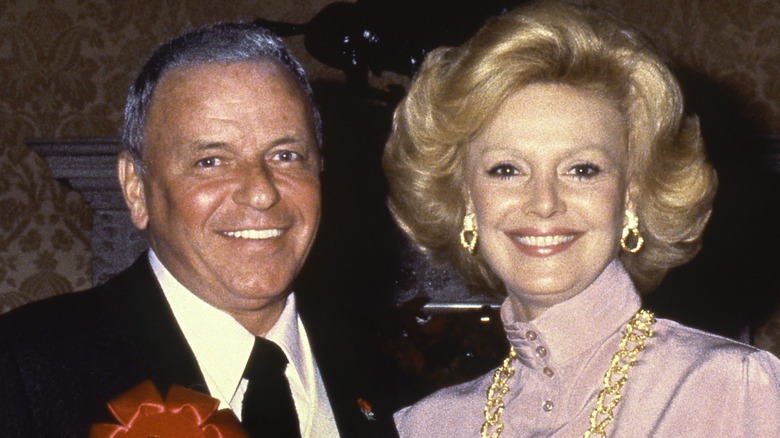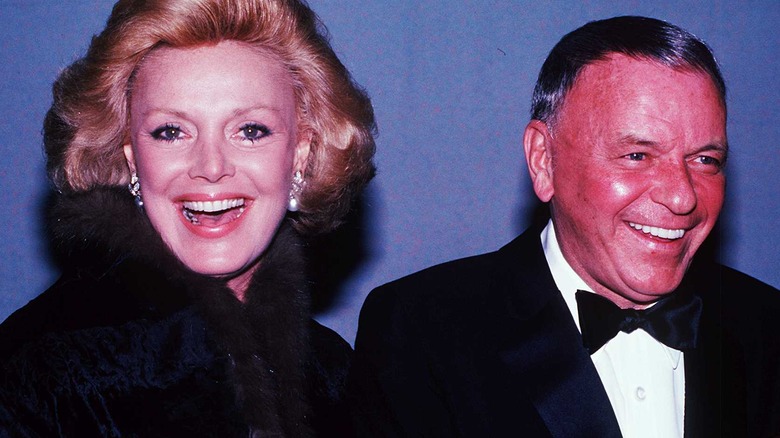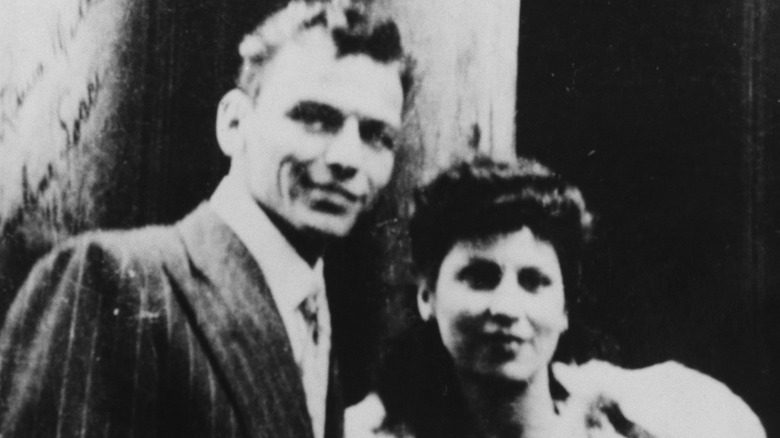The Sad Truth About Frank Sinatra's Marriages
Singer Frank Sinatra, also affectionately known as Old Blue Eyes, The Voice, and Chairman of the Board, was born in 1915 in Hoboken, New Jersey, and became one of the most celebrated crooners of all time. He is known for popular standards such as "My Way," "Strangers in the Night," "Fly Me to the Moon" and "New York, New York." His charismatic personality endeared him to millions of fans, starting in the 1940s. He also appeared on the big screen and earned an Oscar for his role in 1953's "From Here to Eternity." Sinatra spent a good portion of the 1950s and '60s acting in popular films, cementing his status as one of the world's most talented singers and actors.
During this time, it probably comes as no surprise that Sinatra attracted the attention of numerous women, including four that he married. From his first wife Nancy, who stood by his side before he became famous, to his last wife Barbara, who got him to stay with her for over two decades, these women made indelible marks on his life. But as most people know, marriage is hard. And Sinatra was not immune to the problems that can arise between couples.
Sinatra and his first wife, Nancy Barbato, were incredibly poor
Frank Sinatra and Nancy Barbato were both teenagers (19 and 17 years old, respectively) when they met in Long Branch, New Jersey, in 1934. Their families spent their summers on the Jersey Shore. The couple wed five years later at the Our Lady of Sorrows church in Jersey City, where they lived at the start of their marriage, according to The New York Times. The young couple struggled financially, which must be tough for any relationship. Frank gave Nancy his mother's engagement ring because he was too poor to afford one on his own (per the Chicago Tribune). He was a singing waiter, and his new bride worked as a secretary at a printing plant.
In order to save money, Nancy sewed her own clothes and made ties for her husband out of discarded dresses. They didn't have enough money to have meat sauce with their pasta, so they often ate vegetarian entrees instead. While counting their pennies, Nancy supported Frank's burgeoning career. As time went on and he gathered a following, Nancy responded to his fan mail, made him bow ties after concertgoers literally took them off his neck, and moved to the West Coast when Hollywood called.
Sinatra married Ava Gardner a week after his divorce from Nancy was finalized
While Nancy Sinatra was taking care of the home, pinching pennies where she could, Frank Sinatra had a hard time controlling his wandering eye. He cheated on his new bride within a year of their marriage, according to the Chicago Tribune. He kept a photo of a mistress in his wallet and gifted Nancy's jewelry to the other women in his life. As Frank started to get increasingly famous, his girlfriends followed suit: He formed romantic connections to celebrities and blond beauties such as Marilyn Maxwell and Lana Turner. Nancy was humiliated by his transgressions, reports The New York Times.
Then Frank got involved with one of Hollywood's most popular and beautiful stars of the time: Ava Gardner. Their pairing was anything but secret as their relationship made global headlines. Nancy, meanwhile, cried in their extravagant home while her philandering husband traipsed around publicly with Gardner. The two met at a party in 1950, 12 years after Frank and Nancy wed, according to Fox News. The affair became too difficult to ignore, so Nancy eventually (but reluctantly) agreed to a divorce. Frank and Gardner tied the knot just weeks after the divorce papers were signed.
Nancy never stopped loving Frank and divorced him so as not to damage his career
After their divorce, Nancy Sinatra got custody of their three children, Nancy, Frank Jr., and Christina, all of whom eventually followed in their father's footsteps and had entertainment careers. Frank Sinatra's ex-wife also got their home in the prestigious Holmby Hills neighborhood of Los Angeles, a Cadillac, and a portion of Frank's yearly income, reports The New York Times. Despite learning of her husband's affair with Ava Gardner, Nancy had a difficult time letting him go. Later in life, she told Tony Oppedisano, who was a member of Frank's management team and author of the memoir "Sinatra and Me: In the Wee Small Hours," that Frank was a great father who was always there for their children. And she loved him very much despite his extramarital affairs (via Fox News).
She agreed to the divorce because she didn't want to get in the way of his career and feared the drama could damage him professionally. Nancy explained, "The only reason I did eventually decide to grant him a divorce was because back in those days, if you were a public figure, like he was, and fooling around with someone, and it was known that you were married and had children, it would really damage your career.'" While Frank went on to have several marriages, Nancy never remarried, telling Oppedisano that any other man wouldn't have been able to hold a candle to Old Blue Eyes.
Ironically, Frank Sinatra's career plummeted after he married Ava Gardner
Nancy Sinatra divorced Frank, at least partially, because she feared the drama surrounding his affair with Ava Gardner would ruin his career. Well, his career plummeted anyway. According to the Chicago Tribune, Frank had to borrow money in order to hand it over to Nancy for the divorce settlement. Somehow he managed to give Gardner a six-carat diamond engagement ring, so perhaps that contributed to his financial difficulties. He would purchase gifts for Gardner, but he would use the actress's own charge accounts to pay for them.
Frank had been one of America's most beloved singers, but record sales dropped, and he had a tough time getting concertgoers in their seats because his fans had grown up and presumably changed their tastes in music. In addition, his public affair with Gardner hurt his image, according to People. His music career suffered, as did his film career after MGM canceled his contract. He ended up hanging around with Gardner when she was on set, and he was struggling so badly that her studio contract reportedly had a clause in it that included Frank in film projects. At one point, Gardner pleaded with the producer of "From Here to Eternity" to test Frank for a role in the film. He ended up playing the role of Private Angelo Maggio.
Ava Gardner had two abortions while married to Sinatra
Frank Sinatra traveled to Nairobi with Ava Gardner to be on set with her when she filmed "Mogambo." She got pregnant while making the film and decided to terminate the pregnancy after her husband left, without telling him about her condition, according to the biography "Ava, a Life in Movies," as reported by People. Even though Gardner wanted to be a mother, she didn't feel like she could provide a stable environment at that point in her life. Plus, her relationship with Sinatra was not the best, so she had an abortion in 1952. Sinatra eventually learned what happened and was reportedly very upset about it.
They continued to work on their marriage, and she got pregnant a second time. She once again chose to have an abortion. But her reason was also tied up in the studio she worked with and what MGM wanted for their female stars. An article by Vanity Fair reports that biographer Jane Ellen Wayne talked to Gardner, who noted that MGM had "penalty clauses" for actresses who had children. Gardner reportedly feared she would no longer have a job or a salary, and since Sinatra wasn't earning an income, she felt she had no choice but to have an abortion. MGM even helped make travel arrangements so Gardner could have the procedure.
Sinatra and Gardner fought — often
According to biographer Lee Server's book "Ava Gardner: Love Is Nothing," (via Vanity Fair), Gardner and Frank Sinatra had "legendary" fights. At one point, the singer chucked a douche bag filled with water at Gardner and friend Lana Turner. Their love affair was wild from the start. Server reports the pair met at a party in 1949 (other sources say 1950), and the drunken twosome drove from Palm Springs to Indio, California, where Sinatra fired a gun at streetlights and Gardner shot out a hardware store window. They were arrested, but her movie studio paid for their release.
Sinatra and Gardner argued about politics, music, and each other's lovers, according to People. Gardner said of their arguments: "He has a temper that bursts into flames, while my temper burns inside for hours." Sinatra was particularly jealous of Gardner's second ex-husband, Artie Shaw. When he saw the two of them together in 1950 (while Frank was still married to his first wife Barbara, by the way), he shot his mattress two times. They had their ups and downs, and according to Gardner, they had great chemistry between the sheets, but "the trouble usually started on the way to the bidet." According to Express, biographer Anthony Uzarowski, author of the book "Ava Gardner: A Life in Movies," called their affair toxic and explosive. He noted in the Channel 5 documentary "Sinatra: King of the Crooners" that the singer's Palm Springs mansion "still bears the scars of those fights" after a bottle of champagne dented a sink.
During his relationship with Ava Gardner, Frank Sinatra reportedly had suicidal tendencies
As we already noted, during the early 1950s following his divorce with Nancy Sinatra and burgeoning relationship with Ava Gardner, Frank Sinatra struggled professionally. At one point, he reportedly turned on the gas in the oven in his New York City apartment and attempted to take his own life. His manager discovered the singer lying down on the floor and crying, reports PBS. A previous suicide attempt was spurred after Gardner told Sinatra she cheated on him with a Spanish bullfighter. The singer drank and took sleeping pills, but his valet, George Jacobs, found him just in time. All told, Sinatra reportedly tried to kill himself three times while he was in a relationship with Gardner. At one point, he walked into the bedroom with a gun held against his head. Gardner tried to get the gun away from the singer, and it fired. Fortunately, neither one was shot.
According to "Sinatra: Behind the Legend" author J. Randy Taraborrelli (via Express), "Frank loved her, but as his career faltered he believed she didn't love him." The biographer claims that Sinatra was bipolar, moody, and a heavy drinker, and that he described himself as "an 18-carat manic depressive." Taraborrelli maintains that Sinatra was never truly happy because he believed there was always something better around the corner. Sinatra and Gardner's relationship lasted six years.
Mia Farrow was a virgin when she met Sinatra and just 19 when she married him
Actress Mia Farrow was just 18 years old when she starred on the soap opera "Peyton Place," playing a 16-year-old girl named Alison. She was introduced to Frank Sinatra, who used his private plane to pick her up and take her to Palm Springs. She took along her cat. Farrow was a virgin when she met the singer and had only been in bed with a man on film sets, according to The Guardian. The pair dated for a short time before tying the knot when Farrow was just 19 years old and Sinatra was 50. Later on, she reflected that she was unaware of what she was doing, calling herself more immature than other women her age.
She explained, "Poor Frank, saddled with such a child. I would be falling asleep at the table at Las Vegas, trying to talk to people about their cats. He was very patient with me." When Farrow took the lead role in "Rosemary's Baby" instead of starring alongside Sinatra in his film "The Detective," the relationship hit its breaking point. He wound up serving her with divorce papers while she was filming.
Sinatra didn't want Mia Farrow to have a career
One year after meeting Frank Sinatra, Mia Farrow left "Peyton Place" and married the star. Their marriage didn't last two years. Sinatra's mother said of the match (via the Los Angeles Times), "It won't last long, so I guess it's a good thing they weren't married in the church." During a 1989 interview, Farrow said she wasn't sure what type of relationship she was looking for, but it was possibly a father figure. Unfortunately, Sinatra did not approve of Farrow's career, and it caused a rift in their marriage.
"Rosemary's Baby" took longer to film then scheduled, and it kept her away from her husband. Sinatra had told his wife that she shouldn't be making films. "In terms of what Frank would say, I shouldn't have done any movies," Farrow told Vanity Fair. "He's on the record saying, 'I'm a pretty good provider. I can't see why a woman would want to do anything else.'" She added that she felt guilty about working and doing something for herself. Farrow believes Sinatra would have been much happier had she stopped acting and just traveled with him and stuck by him. She lost a bit of her confidence after making "Rosemary's Baby" and didn't think she'd ever work again. However, When asked by Vanity Fair in 2013 if Sinatra was the great love of her life, she answered "yes."
Sinatra's fourth wife, Barbara, had an affair with him
Barbara Blakely Oliver first met Frank Sinatra in 1957 in Las Vegas, at the peak of his career. She avoided the star because he was drunk, according to The Washington Post. She went on to marry Zeppo Marx (her second husband) of the Marx Brothers and became friendly with Sinatra in the early 1970s, following his divorce from Mia Farrow. Barbara and Marx were friends and neighbors with Sinatro in Rancho Mirage, California. But soon it turned into something more. She and Sinatra had chemistry, and Barbara later said of their connection that he was a flirt through and through: "And there's no way to avoid that flirtation. No way."
Barbara finalized her divorce from Marx in 1973, but by then she and Sinatra had already cemented their relationship. She spent time with him on tour and helped him relax after his performances. He put an engagement ring in a glass of champagne, and they tied the knot in 1976. Barbara also agreed to sign a prenup, which was probably a good call on Frank's part after having three failed marriages behind him. While Frank was a heavy drinker, Barbara helped him cut back a little on the booze. They were married for 22 years until his death in 1998 at the age of 82.
Barbara Sinatra was embarrassed by her married name
Barbara Blakely Oliver Marx Sinatra changed her name several times throughout her life, but her final iteration was a little difficult for her to get used to. In her memoir, "Lady Blue Eyes: My Life with Frank," Barbara explained (via the Hollywood Reporter) that she was a little embarrassed to use his last name when making reservations or other types of appointments.
She explained that it took a total of five years before she finally agreed to Frank's proposal, and they tied the knot in 1976. One of the most challenging things for her to accept was being officially connected to the famous singer — and using his last name. She said: "It probably took another year before I grew accustomed to the idea that I now carried his iconic name. At first, I'd almost whisper when booking a restaurant reservation or beauty parlor appointment. Even to say 'Mrs. Sinatra' out loud felt like bragging." The couple was married for 22 years, and Barbara died at the age of 90 in 2017.
Frank Sinatra considered going back to his first wife while still married to his last
While Frank Sinatra's longest marriage was with his last wife, Barbara, the singer still held a torch for his first love, Nancy. According to Tony Oppedisano, a member of Frank's management team and author of the memoir "Sinatra and Me: In the Wee Small Hours," Frank thought about going back to Nancy toward the end of his life. The pair had a lifelong friendship and a connection that endured throughout all of Frank's relationships over the years, according to Fox News.
Even after Frank and Nancy split up, the former couple remained in contact with one another. In addition to visiting their children, he and Nancy spent many nights on the phone together and spent holidays and birthdays with one another. His granddaughter A.J. Lambert recalled in 2015 during an interview with Vanity Fair (via the The New York Times): "I can remember times when she would be on the phone with her ex-husband, and the next thing I knew some eggplant was coming out of the freezer to thaw so that she could make him some sandwiches when he showed up." Still, Frank remained loyal to his last wife, Barbara, because "too many people would have gotten hurt" if he left her for Nancy, Oppedisano claimed.
